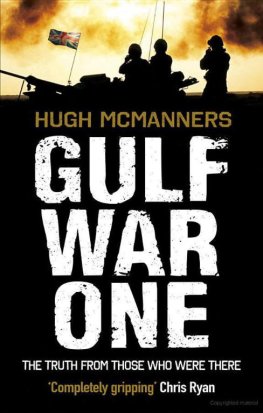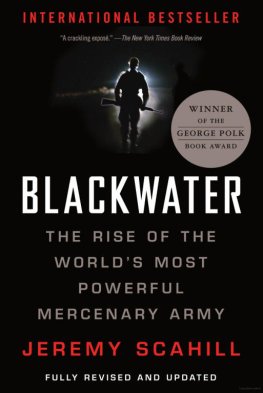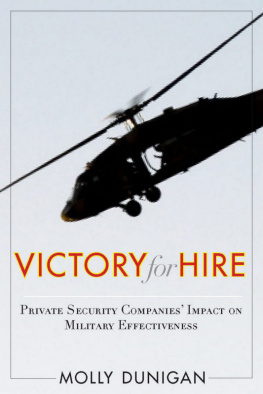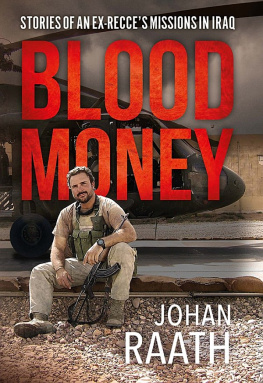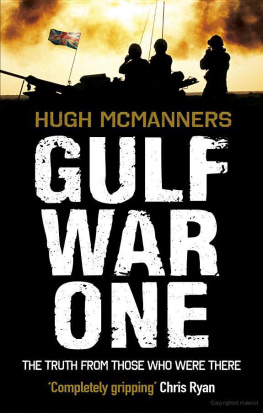A BLOODY
BUSINESS
Americas War Zone
Contractors and the
Occupation of Iraq
Colonel Gerald Schumacher
United States Army Special Forces (ret.)

Dedication
To the memory of Wolf Weiss, the Consummate Warrior,
and to all the men and women who do not wear a uniform yet
go into harms way to serve our country.
Table of Contents
Acknowledgments
One would think that civilians who have taken jobs to work in Iraq would be anxious and open to discussing their experiences. They are anxious but most are not open. Although many want to express themselves, the media has not been kind to these men and women or the firms they work for. They are warned by their employers to stay far away from the press, and they are often restricted by their contracts. Many are afraid of losing their jobs if they tell their story without their employers approval. A number of contracting firms refused to cooperate in the making of this book without screening the stories, which was out of the question. The filter of official involvement would have compromised the stories. These are not official accounts; they are reality.
Two companies stepped up to the plate without imposing any restrictions or conditions and without any threats or guidance to restrict their employees voices: MPRI and Crescent Security. They did not ask for editorial review nor did they stage any dog-and-pony shows. They were accommodating, candid, and honest. Their employees were permitted to speak freely. I sincerely appreciate their help and respect the risks they took. Thank you Rick Kiernan, director of media relations for MPRI. Rick paved the way for this book by opening MPRIs doors and coordinating my trip to facilities in Kuwait and Iraq, which then led to subsequent contacts in those countries.
A big thanks to Larry Word, the retired army colonel who runs Team Viper at MPRIs training base along the Kuwait-Iraq border. After spending several days with his team, and without any advance notice, I interrupted a formal meeting and informed Larry that I was headed north into Iraq with another contracting firm. I recall him looking at me with great concern. Then he looked around the room and said, Gentlemen, I think this is a good time for a break. He turned to one of his men and ordered, Get this man some gear for his trip. Next thing I knew I was being loaded up with body armor, helmets, and other equipment that would help keep me alive. This was one of those moments in which an American just does something for you because you are a fellow American.
I owe a special debt of gratitude to Renee Taylor, the wife of a KBR contract truck driver. Renee spent countless hours researching information, getting me in touch with other drivers, and reviewing stories for accuracy. Her limitless and energetic support of her husband, Mark, truckers in Iraq, and their families is a tribute to her selfless character. Thank you, Renee. Thank you very much.
Many thanks to Mrs. Sheila Powell, whose husband, Steve, was a diesel mechanic in Iraq. Throughout the course of writing this book, Sheila sent me articles, stories, contacts, and information about contractors and their experiences. Her undying love, respect, and support of Steve was reflected in everything she did. Hes a lucky man.
To Franco Pecco, the owner of Crescent Security, and his director of security, Scott Schneider, I extend my heartfelt appreciation. Not only did Franco and Scott let me bunk with them and allow their people to talk with me freely, Scott took me along, riding shotgun on the roads in Iraq. Scott went through great lengths to make sure that I saw whatever I wanted to see and that I lived to write about it. They never rested until we were safely back inside the wire at some military base or crossed the border into Kuwait. They are a tireless and professional crew, and I would not hesitate to trust my life to them. Thank you.
Two very important people who warrant special recognition are Jake Guevarra and Charles Rudolph, U.S. security contractors in Iraq. Thank you for all your help in putting together the details of your moments of terror and exhilaration. Your honest and humble insights show the truly human nature of facing inner demons and struggling with the prospect of impending death. Your contributions to this book were enormous.
I offer my appreciation to Ken McDonald, Mark Taylor, and Jeff Dye, Iron Pony Express truck drivers who contributed much to this book. For the townspeople of Paris, Illinois, who turned their little community upside down to welcome home their kids, you represent the finest traditions of the American people. And to the families from Paris, Illinois, whose sons and daughters paid the ultimate sacrifice, the United States is forever indebted to you.
Prior to leaving for Iraq, Roy Hamilton opened his home and marksmanship facilities to me in Pyramid Lake, Nevada. Roy was kind enough to provide loads of ammo and an assortment of weapons to practice with. As it turned out, this stop en route to the Middle East proved to be far more valuable than I would have predicted. I really appreciate the opportunity to have the rust shaken out of my spokes.
Thanks much to Hans Halberstadt, the author of numerous military special operations books, who got me started in this whole business of writing. Time and again, Hans was there as a considerate friend through countless episodes when I pestered him about this endeavor. Thanks to Ben Parsons, my friend and business associate, who I force to read everything I write and always accommodates me with a smile and a pointed, educated review. My acknowledgments to Steve Gansen, my editor, who took such a deep personal interest in making this book come together. Steve, you contributed much, and I sincerely appreciate all your effort and concern.
Id like to proffer a deep and very personal thanks to my mother, Grace Hendrickson, who, many years ago, nudged me into creating and editing my eighth-grade newspaper, The Magpie, at Saint Margarets School in Chicago. Your intellectual acumen and your voracious appetite for literary works have been an inspiration and source of strength throughout my life. Thank you to my wife, Deb, my son Kevin, our friend Tosca, and my daughters Tamara and Ashley, who read or listened to the many drafts and lent your opinions, as different as they may be. I appreciate the fact that you never cut me any slack. You are truly an acid test, and I wouldnt trade a one of you.
Introduction
Many Americans believe that war should be the exclusive purview of soldiers. This thinking ignores the realities of insurgent warfare, the requirements of nation building, the complexities of battlefield technologies, and the willingness of volunteers to join a downsized military in the absence of a national draft. Some people might be surprised to know just how many civilian contractors are out there working in the shadows, performing high-risk jobs in training, equipping, and developing foreign troops, and who are influencing battle plans in dozens of countries throughout the world.
Since the first Gulf war in 1991, the proportion of private forces to military personnel has more than quadrupled, and today the number of private contractors employed by the Pentagon is more than seven hundred thousand by some estimates. The soldier of fortune has taken on an entirely new dimension in the modern war zone. When the political environment is not conducive to the deployment of U.S. forces, our government hires civilians to execute its foreign policy. This makes them more than a surrogate army in indirect support of U.S. combat operations; they are a virtual surrogate government.


